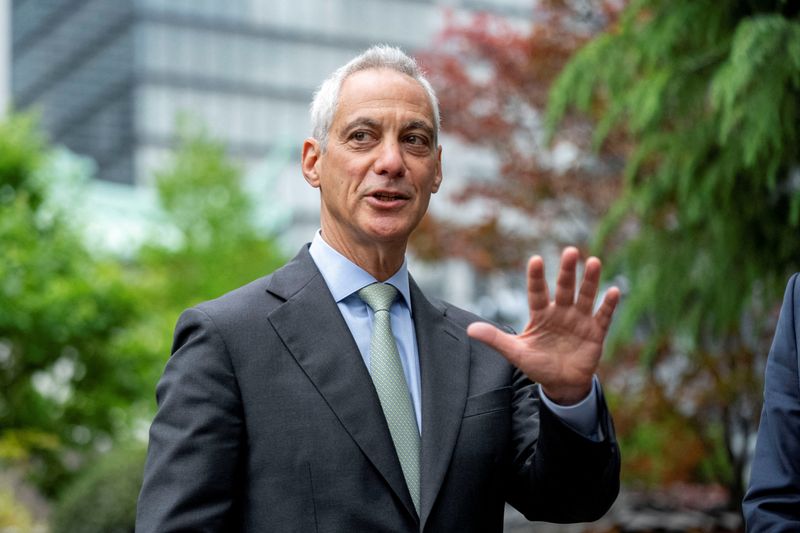By Humeyra Pamuk, Trevor Hunnicutt and Tim Kelly
WASHINGTON/TOKYO (Reuters) - When a Reuters reporter asked a U.S. State Department spokesperson this week about a sarcastic social media post by the U.S. ambassador to Japan concerning China's missing defense minister, the reply was appropriately diplomatic.
The ambassador, Rahm Emanuel, has always spoken in "a colorful manner," said Matthew Miller, restraining a smile, although he declined to say whether Emanuel's comments had been cleared by the State Department.
Emanuel, a legendary Washington political fighter who has served three Democratic presidents, had written on social media platform X, formerly known as Twitter, that the recent disappearances of top Chinese officials resembled Agatha Christie's best-selling crime novel "And Then There Were None," which follows the mysterious deaths of guests at a mansion in Britain.
"First, Foreign Minister Qin Gang goes missing, then the Rocket Force commanders go missing, and now Defense Minister Li Shangfu hasn't been seen in public for two weeks. Who's going to win this unemployment race? China's youth or Xi's cabinet?," Emanuel wrote.
On Thursday, he speculated in another post that Li might have been detained. "Might be getting crowded in there," he wrote.
Li has not been seen in public for more than two weeks. On Friday Reuters reported that the defense official, handpicked by Chinese President Xi Jinping, has been placed under investigation by Chinese authorities, according to 10 people familiar with the matter.
In July, Foreign Minister Qin Gang was replaced after not being seen in public for over a month. He had been appointed to the post only seven months previous.
POLICY OR OPINION?
Though common on social media, pointed sarcasm is almost unheard of in the buttoned-down world of diplomacy, where ambassadors' comments are carefully vetted and scrutinized for nuance.
So naturally, Emanuel's posts have raised questions about whether they reflect the views of the administration of Joe Biden, who Emanuel has known for years, dating back to the Obama White House.
"I would guess that the Chinese government views Ambassador Emanuel's remarks as authoritative and deliberate signaling. I doubt that's the case," said Bonnie Glaser, a China expert at the German Marshall Fund of the United States.
A Chinese embassy spokesperson said Beijing noted Emanuel's remarks. "We hope the U.S. side can stop smearing China and do more things that are conducive to enhancing understanding, trust and cooperation between the two countries," she said.
A source familiar with Biden administration dynamics said Emanuel's comments were likely not part of an agreed approach.
"Rahm is not subject to the rules that other ambassadors and senior officials follow," the source said. "I suspect that some of his public commentary makes the White House pretty uncomfortable, but his relationship with the President makes him effectively untouchable."
"There may be some who view his tweets and commentary as a useful foil, but there is no deliberate strategy that I am aware of," the source said.
On Friday, the State Department did not have immediate comment on whether Emanuel's tweets on Li reflected the knowledge and understanding of the U.S. government or whether they were his personal opinion. The U.S. embassy in Japan declined to comment.
ANTI-CHINA U.S. AMBASSADOR
Emanuel, 63, previously served as an aide to former President Bill Clinton and as former President Barack Obama's White House chief of staff, when he was known as an effective enforcer, nicknamed "Rahmbo."
In 2010, he successfully ran for mayor of Chicago but decided not to seek re-election in 2019 following controversy over his decision not to release footage of the shooting of a Black teen, Laquan McDonald.
The combative Democrat is known for his use of colorful and sometimes profane language. At the start of his time at the Obama White House, he had a name plate on his desk given to him by his brothers that read: "The Undersecretary for Go Fuck Yourself."
In Japan, his longstanding West Wing ties are seen as an advantage by the government of Prime Minister Fumio Kishida, which is eager to tighten bonds with Washington, a senior Japanese official told Reuters.
Within China, Emanuel has a reputation as an anti-China ambassador, said Yun Sun, director of the China Program at the Stimson Center, adding that Beijing believes his position as ambassador to Japan should not afford him a role on relations between the U.S. and China, which have been tense in recent years.
Emanuel has kept close ties with Biden, hosting him privately at the ambassador's residence in Tokyo, and is closely connected with members of Biden's inner circle, a rare direct line for an ambassador.

All of that suggests that the administration is unlikely to rein in its Japan ambassador.
"He's developed an extremely close relationship with the Japanese to advance the alliance and U.S. interests and is expressing his point of view," said an administration official.